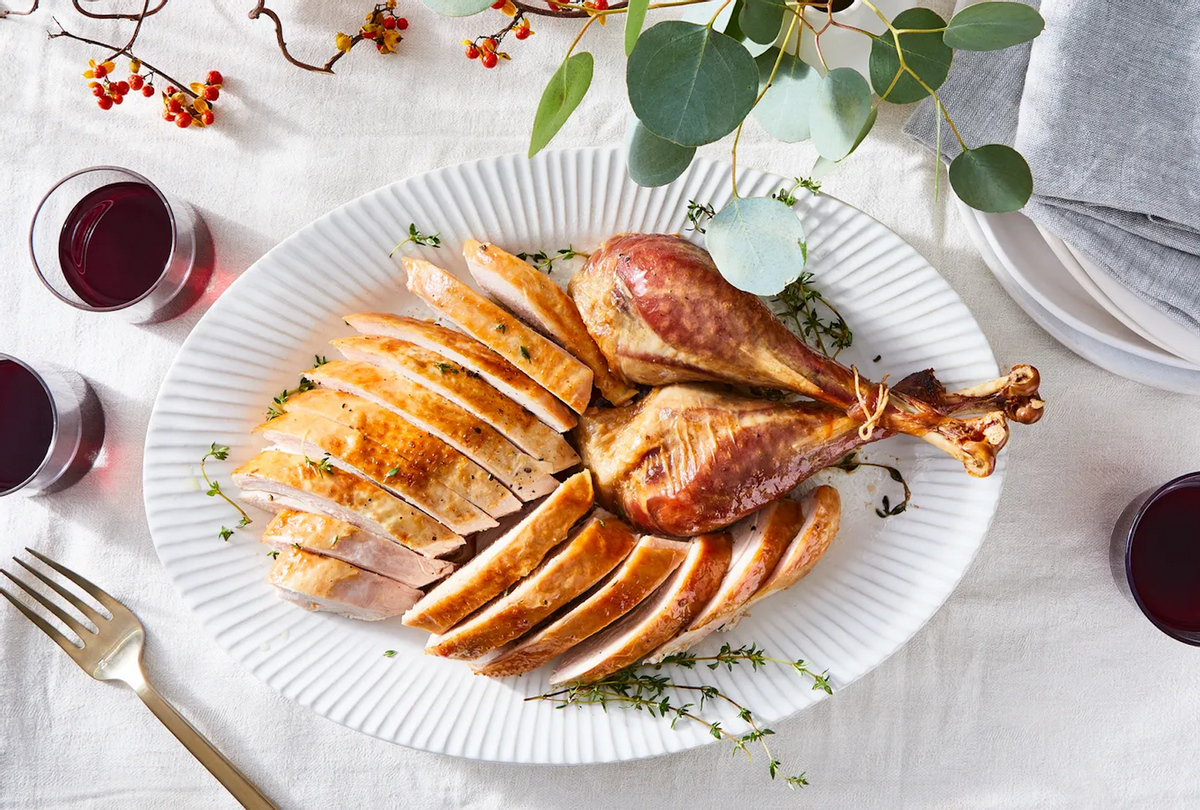For many of us, Thanksgiving is the one meal where we purposefully plan for leftovers. A Thanksgiving meal without leftovers just isn't right in my opinion. This Thanksgiving, much like last year, will probably look a little different than the traditional holiday — whether that means on a video call or just pared down. Either way, smaller celebrations can mean more leftover food, especially if you can't fathom Turkey Day without the turkey. So when it comes to leftover turkey, how long does it actually last in the fridge? And can you freeze it? It's not as simple as a yes or no, so let's dive in.
First let's clarify something: We're talking cooked turkey. If you have leftover raw turkey, you can certainly store it in the freezer and save it for another day! Here are two tips to help ensure you're doing it safely. First, keep turkey, or any meat for that matter, in its original packaging. Manufacturers choose this packaging because it's typically air-sealed to keep bacteria out. If there's a tear or puncture in the packaging, you should repackage it in an airtight container or wrap tightly in plastic wrap. The more you expose the meat to air and bacteria, the more you increase the potential for spoilage. Secondly, make sure your freezer is set to actually freeze; that means it maintains a temperature of 0°F or below. If you have a separate fridge or chest freezer in the basement that gets used less frequently, this is the time to use it. The more you open and use the freezer, the harder it has to work to regulate the temperature. A frozen whole turkey can be kept for approximately 12 months in a freezer set at or below 0°F, while pieces will start degrading in quality slightly sooner, at around 6 to 9 months.
Now, what about the leftovers from Thanksgiving dinner? According to the USDA, leftovers will last up to 3 to 4 days in the refrigerator, but if you know you have more than you can eat in a few days, freeze it sooner rather than later. To freeze cooked turkey, first pick the meat from the bones. If you want to freeze dark and light meat separately, now would be the time to sort it. If you have a whole breast left, the CDC recommends slicing it so it cools down faster and you can get it into the fridge or freezer sooner. It also makes reheating easier, so win-win! If you're going to save the bones to make soup or stock, freeze those separately as well.
Then there is the question of how to store leftover turkey meat: plastic wrap, zip-top bag, airtight container? The answer is: It doesn't really matter, so long as they're freezer-safe and you do your best to squeeze out as much air as possible. Then cram as much meat as you can into each container; the more air trapped in the container, the more potential for freezer burn. I prefer to wrap individual portions in plastic wrap, then place multiple in a reusable zip-top bag or freezer-safe container. I also try to utilize labeling to my advantage; we all know that once things go into the freezer, they can easily get lost in the abyss. Again, turn to that secondary freezer if you have one! If you don't, you can still place leftovers toward the back of the freezer, away from the door. Consumer freezers often don't close solidly, and again, with frequent opening and shutting, the temperature fluctuates. As for how long to keep said leftovers, the USDA recommends utilizing them up within 2 to 6 months for the best quality. After that, they start to degrade in quality and taste, so best to discard to avoid food poisoning.
When it comes time to use frozen leftovers, make sure you defrost them thoroughly, ideally in the fridge overnight. If heating them from frozen, make sure they reach 165°F on a food thermometer for guaranteed safety. And try your best to only thaw and reheat once. Each time you cool food to freezing then reheat it, the higher the risk for food poisoning becomes, not to mention the taste and texture will degrade. This is also why pre-portioning will be your best friend when it comes to Thanksgiving leftovers.




Shares